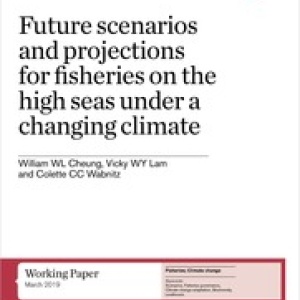
This working paper from the UK-based policy research organisation International Institute for Environment and Development explores the costs and benefits of different scenarios for future governance of high seas fisheries (i.e. those in international waters) under a changing climate.
In the first scenario, global cooperation towards sustainable development goals leads to lower impacts on high seas fish stocks from both fishing and climate change. In this case, high seas fisheries make relatively low contributions to income and livelihoods.
In the second scenario, national interests (notably those of high-income countries) drive higher exploitation of high seas fisheries (supported by subsidies). Marine biodiversity is impacted strongly by both fishing and climate change. High demand and lower regulation mean that fishing may expand to beyond economically optimal levels. Subsidies may be used to support fisheries in meeting high demand for seafood.
In the third scenario, high seas fisheries are exploited intensely, primarily to support the rapid economic development of lower-income countries. Fishing intensity in this scenario has the highest impacts across the three scenarios. High greenhouse gas emissions will reduce both productivity and profitability of high seas fisheries.
Read the full working paper, Future scenarios and projections for fisheries on the high seas under a changing climate, here. See also the Foodsource resource How do food systems affect fish stocks and marine habitats?







Post a new comment »